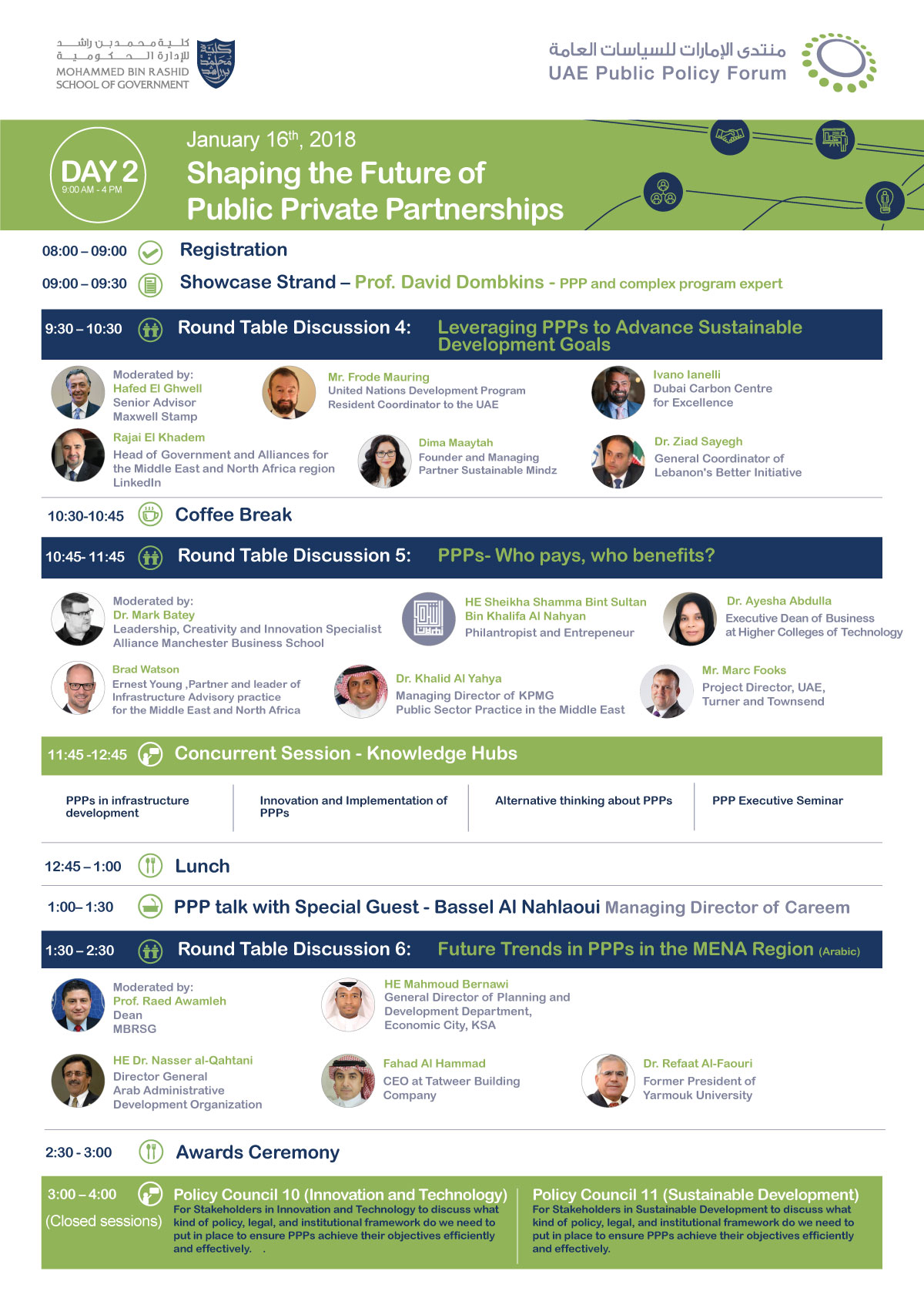Description
As governments around the world seek to provide a growing population with the required public services and infrastructure, there is an increased interest in using Public-Private Partnerships (PPPs) as a solution. In the UAE, the PPP framework that is evident acknowledges and structures the role for government as one that ensures that social obligations are met through successful sector reforms and public investments alongside private sector engagement. This participatory model holds vast potential and requires policy adaptation to optimize the mutual benefits to the public and private sectors as well as citizens.
In 2015, the state government of Dubai enacted Law No 22 on Public Private Partnerships to leverage economic development through sustainable development projects. In so doing, Dubai modelled international best practices and entered into PPPs which attracted private capital investment, supplemented public resources in a post oil economy, created employment opportunities and increased efficiency and accountability in numerous sectors. As a result of these PPPs, public provisions have seen remarkable reforms and diversification. The Department of Finance (DoF), which overseas PPPs in Dubai, clearly articulated the importance of this model for national and regional development in the 2016 edition of the PPP guidebook, which they developed. Successful examples of PPPs have been realized in the following sectors:
- Education
- Health
- Transport
- Technology & Innovation
- Sustainable Development
- Urban Planning
The UAE Public Policy Forum is organized by the Mohammed Bin Rashid School of Government and aims to evaluate and discuss the potential of public private partnerships in the aforementioned areas to help private and public sectors stakeholders to evaluate ongoing PPPs in the UAE, exchange ideas and experiences of best practice in PPPs and establish networks for future PPP policy development.
The plenaries, seminars, academic presentations, exhibits and knowledge hubs at the forum will be structured around six pillars:
- Defining, designing and evaluating PPPs. (What are PPPs in the UAE context?)
- Enabling environments for PPPs . (Political , legal, financial and institutional frameworks)
- Strategic Planning for PPPs. (What is the process for developing and implementing a PPP project?)
- Accountability and performance of PPPs. (case studies, alternative models)
- Technology and innovation in PPPs.
- Policy development for PPPs in the future.
Why Attend
In a knowledge based economy, bench marking against best practice and adopting successful models for conducting public private partnerships is one way to ensure success. The UAE Public Policy Forum on Shaping the Future of Public Private Partnerships is a unique opportunity to hear from experts, policy makers , investors researchers and other stakeholders as they share their expertise about strategies, technology, policy implications and process associated with public private partnerships locally and globally.
As a delegate at the UAE Public Policy Forum, you will be able to:
- Expand your network from the delegates you will meet at a conference
- Connect and collaborate with stakeholders in several industries.
- Gain insights into the pipeline of projects, tenders and RFP.
- Question expert presenters during the two day event and afterwards.
- Share knowledge/solutions with clients, peers and industry experts.
- Engage with thought leaders to address specific problems.
- Raise brand awareness for your company through networking and sponsorship.
- Meet local and international government officials who have the authority to influence PPP.
Who should attend
The UAE Public Policy Forum is for key decision makers interested or involved in exploring public-private partnerships. Delegates will benefit from opportunities to network with the industry’s most influential professionals, experts, service providers and public leaders. Conference demographics include:
Government: key decision makers across municipal, state and federal levels of governments including public agencies focused on healthcare, education, transportation, ICT and sustainable development.
Private Sector: executives, presidents, vice presidents, business development leaders, investors and managing directors
High Education: chief financial officers, business officers, researchers, academics, students, chancellors, governing board members, and Deans
Public: a general audience with an interest in PPP
Delegates from the general public will benefit from our industry experts presenting their knowledge and valuable insights into the PPP trends that are redefining the public sector.
More experienced professional delegates will benefit from our networking opportunities to cultivate relationships with key industry influencers.
Call for paper
Important Dates
Draft paper submission deadline:2018-10-21
Abstract submission deadline:2018-08-15
Call for paper description
The plenaries, seminars, academic presentations, exhibits and knowledge hubs at the forum will be structured around six pillars:
- Defining, designing and evaluating PPPs.
- Enabling environments for PPPs
- Strategic Planning for PPPs.
- Accountability and performance of PPPs (case studies, alternative models)
- Technology and innovation in PPPs .
- Policy development for PPPs in the future.
Developing PPP policy that outlines clear procedures, roles and mechanism for implementing and managing PPPs is essential for the success of the programs. Government entities and their private sector partners need to have a sound understanding of the policies that drive their partnerships and be confident that all the legal and social implications are well defined and agreed upon.
How can the PPP policies shape the success of PPPs in the UAE? What are the pitfalls to be avoided in developing such a policy? What degree of flexibility should be built into the PPP policies?



